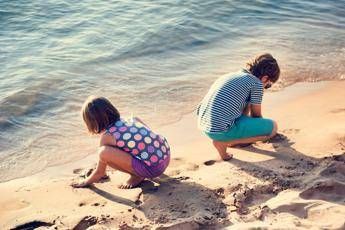
Doctors Appeal for Enhanced Child Safety and Well-being at BeachesDoctors Appeal for Enhanced Child Safety and Well-being at Beaches At the recent 7th International Workshop of Green Flags and 10th National Congress of Green Flags, medical experts have issued an urgent call to improve the safety and health of children at beaches. They propose several initiatives aimed at preventing drowning, skin cancer, and other potential hazards. 1. Free Sunscreen Dispensers Doctors advocate for the installation of free sunscreen dispensers at beach establishments to ensure that children and their families have easy access to sun protection. Sunburn and erythema, common in childhood and adolescence, are risk factors for cutaneous melanoma, the most feared skin cancer. 2. Inflatable Armbands for Non-Swimmers To prevent drowning, beach resorts and municipalities are encouraged to provide free inflatable armbands to all children under 4 years old and non-swimmers. This measure aligns with the Green Flags decalogue, which emphasizes the importance of armbands for children entering the water. 3. Mandatory AEDs and Trained Staff The experts reiterate the crucial importance of mandatory semi-automatic external defibrillators (AEDs) in all public institutions, including beach resorts. Trained staff must be available to operate the devices. AEDs increase the chances of survival in the event of cardiac arrest tenfold, making them a vital life-saving tool.

Equip beaches with free sunscreen dispensers, give children bracelets and respect the obligation to have life-saving defibrillators for cardiopulmonary resuscitation. This is the appeal to seaside resorts and seaside resort municipalities by doctors who, in recent days, have participated in Fasano, in the province of Brindisi, in the 7th International Workshop of Green Flags – 10th National Congress of Green Flags, the official event for the delivery of the 2024 Green Flags to child-friendly beaches, chosen by pediatricians. Italo Farnetani, Professor of Pediatrics at the University of Malta Ludes-United Campus and ‘father’ of the Green Flags, illustrated the new proposals to Adnkronos Salute. He had already proposed two initiatives for the double event: half portions on the menu and breastfeeding points accessible to everyone in bars, restaurants, hotels and seaside resorts.
Following the example of countries abroad that offer sunscreen in dispensers, the doctor explains, is “a request from Francesca Farnetani, associate professor of dermatology at the University of Modena and Reggio Emilia. The aim is the prevention of cutaneous melanoma”, the most feared skin cancer, which has among its risk factors “sunburn and erythema that are experienced throughout life, especially during childhood and adolescence. To prevent this, it is essential to use sunscreen diligently, not only by applying it every 3 hours, but also by repeating the action after a dip in the sea or sweating a lot. Because even the so-called ‘waterproof’ creams, although slower, are eliminated by water. Hence the proposal to place free dispensers with sunscreen in beach establishments”. A stock that is always available and ready to use.
Another “gift idea” comes from Farnetani himself: “I have advised the owners of beach resorts, but also the mayors – he specifies – to provide free inflatable armbands to all children under 4 years old and in general to anyone who cannot swim. I remember, in fact, that the decalogue drawn up by the pediatricians of the Green Flags recommends, among other things, that children who go into the water should always wear armbands”. A potentially life-saving gift “especially in light of the remarkable influx of foreign tourists to Italian beaches, often from countries less familiar with water and the marine environment. Countries where there are also many skin types that are more sensitive to the sun, for which the availability of free sunscreen would be even more important”.
Finally, AEDs, semi-automatic external defibrillators, are mandatory in every institution. “The importance of this has been reiterated – reports Farnetani – by Goffredo Vaccaro, anesthetist and resuscitator. The use of the defibrillator increases the chances of survival in the event of cardiac arrest by a factor of ten. The obligation also includes the training of staff trained in the use of the AED, and the remote telephone assistance provided by the emergency operation centres can be invaluable. For a defibrillator, the cost can be limited, even 750 euros, stressed Vaccaro”. In return, a priceless result: many lives saved.